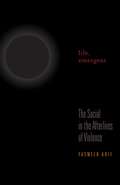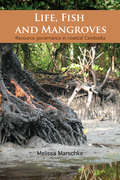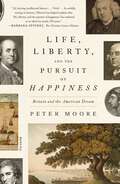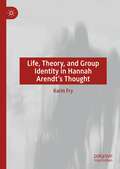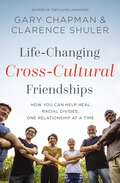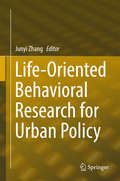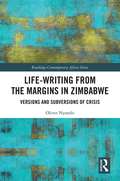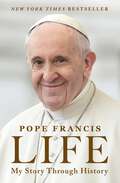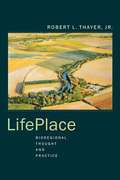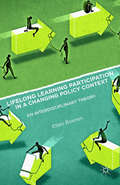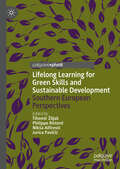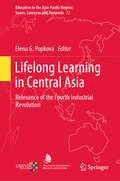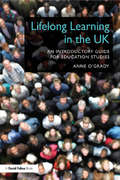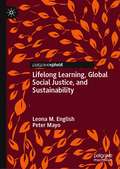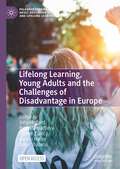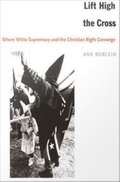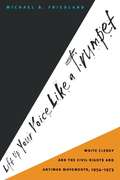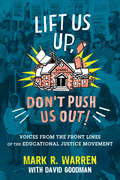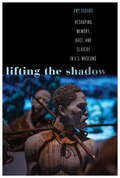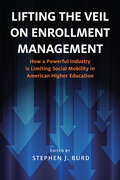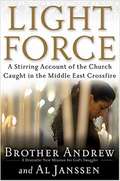- Table View
- List View
Life, Emergent: The Social in the Afterlives of Violence (A Quadrant Book)
by Yasmeen ArifHow does an inquiry into life as it lives (or dies) amid mass violence look like from the perspective of the &“social&”? Taking us from Sierra Leone to India to Lebanon, Life, Emergent challenges conventional understandings of biopolitics, weaving a politics of life through the lens of life, not death. Arguing that the &“letting die&” element of biopolitics has been overemphasized, Yasmeen Arif zeros in on biopolitics&’ other pole: &“making live.&” She does so by highlighting the various means and the forms of life configured in the aftermath—or afterlives—of violent events in contexts of law, justice, community, and identity. Her analysis of the social repercussions is both global and local in scope. Arif examines the convictions made in the Special Court of Sierra Leone, the first hybrid court of its nature under international criminal law. Next, she explores the making of a justice movement in the context of Hindu–Muslim violence in 2002 in the state of Gujarat, India. From there she revisits the Sikh carnage in Delhi of 1984. Finally, she explores a span of civil violence in Lebanon, and particularly, its effects on the city of Beirut. This rigorously argued book brings together the various strands of life and the social that each chapter has disentangled—and in doing so it begins to frame a politics of, and in, life.
Life, Fish and Mangroves: Resource Governance in Coastal Cambodia (Governance Series)
by Melissa MarschkeIn Life, Fish and Mangroves, Melissa Marschke explores the potential of resource governance, offering a case study of resource-dependent village life. Following six households and one village-based institution in coastal Cambodia over a twelve-year period, Marschke reveals the opportunities and constraints facing villagers and illustrates why local resource management practices remain delicate, even with a sustained effort. She highlights how government and business interests in community-based management and resource exploitation combine to produce a complex, highly uncertain dynamic. With this instructive study, she demonstrates that in spite of a significant effort, spanning many years and engaging many players, resource governance remains fragile and coastal livelihoods in Cambodia remain precarious.
Life, Liberty, and the Pursuit of Happiness: Britain and the American Dream
by Peter Moore“Gripping . . . Vibrant . . . A wonderfully absorbing and stimulating book.” —Sarah Bakewell, NBCC Award–winning author of How to Live and Humanly Possible“[A] rollicking account . . . The book’s compulsive readability is a tribute to Moore’s skill at cracking open the pre-revolutionary period.” —Charles Arrowsmith, The Washington PostA spirited group biography that explores the origins of the most iconic words in American history, and the remarkable transatlantic context from which they emerged.The most famous phrase in American history once looked quite different. “The preservation of life, & liberty, & the pursuit of happiness” was how Thomas Jefferson put it in the first draft of the Declaration, before the first ampersand was scratched out, along with “the preservation of.” In a statement as pithy—and contested—as this, a small deletion matters. And indeed, that final, iconizing revision was the last in a long chain of revisions stretching across the Atlantic and back. The precise contours of these three rights have never been pinned down—and yet in making these words into rights, Jefferson reified the hopes (and debates) not only of a group of rebel-statesmen but also of an earlier generation of British thinkers who could barely imagine a country like the United States of America.Peter Moore’s Life, Liberty, and the Pursuit of Happiness tells the true story of what may be the most successful import in US history: the “American dream.” Centered on the friendship between Benjamin Franklin and the British publisher William Strahan, and featuring figures including the cultural giant Samuel Johnson, the ground-breaking historian Catharine Macaulay, the firebrand politician John Wilkes, and revolutionary activist Thomas Paine, this book looks at the generation that preceded the Declaration in 1776. Everyone, it seemed, had “life, liberty, and the pursuit of happiness” on their minds; Moore shows why, and reveals how these still-nascent ideals made their way across an ocean and started a revolution.Includes 16 pages of black-and-white images
Life, Theory, and Group Identity in Hannah Arendt's Thought
by Karin FryPhilosophy typically ignores biographical, historical, and cultural aspects of theoriss’ lives in an attempt to take a supposedly abstract and objective view of their work. This book makes some new conclusions about Arendt’s theory by emphasizing how her experience of the world as displayed in her archival materials impacted her thought. Some aspects of Arendt’s life have been examined in detail before, including the fact she was stateless as well as her affair with Heidegger. Instead, this work explores different topics including the biographical and narrative moments of Arendt's own work, the role of archiving in her thought, pivotal events that have not been archived, her understanding of her own identities, and how it affected the role of identity politics in her work. Typically, group action is underemphasized in Arendt scholarship in comparison to individual action and often identity politics questions are considered to lie within the realm of the private. Although Arendt’s theory is problematic when discussing issues concerning identity politics, she did think identity politics could be public and political and that effective political actions may occur within groups. What makes this project unique are the innovative conclusions made by moving the archival and biographical evidence to the center in order to understand her theory more accurately and within its historical and cultural context. This volume will be of interest to professional scholars in Arendt’s work, but also to those who have a more general interest in her life and theory.
Life-Changing Cross-Cultural Friendships: How You Can Help Heal Racial Divides, One Relationship at a Time
by Gary Chapman Clarence ShulerWe can heal our communities--one friendship at a time.Many of us want to do something to improve race relations, but we don't know where to start or even if we can make a difference. In Life-Changing Cross-Cultural Friendships, beloved authors and good friends Gary Chapman and Clarence Shuler answer those questions and more by recounting their own story together.Long before Gary was the bestselling author of The 5 Love Languages and Clarence was the president and CEO of Building Lasting Relationships, they were just an associate pastor and a young high school student, bonded by a love of Christ and learning how to navigate their newly desegregated community. Decades of friendship later, they are sharing the important lessons they learned that will enable you to experience enriching friendships across racial and ethnic barriers.Each chapter of this inspiring and practical book will guide you into a deeper level of understanding about what friendship is and about the benefits of cross-cultural friendships on an individual and national level. These powerful lessons will include:The importance of choosing the right wordsHow to differentiate true friends from mere acquaintancesHow Jesus initiated a cross-cultural relationshipThe first two steps to your own cross-cultural friendshipThree ways to resolve conflict in a cross-cultural friendshipHow to make friendships last through life's many seasonsBreaking down the walls of division might not be easy, but the simple act of building friendships tears down walls of racism and fear. Will you accept the cross-cultural friendship challenge?
Life-Oriented Behavioral Research for Urban Policy
by Junyi ZhangThis book presents a life-oriented approach, which is an interdisciplinary methodology proposed for cross-sectoral urban policy decisions such as transport, health, and energy policies. Improving people's quality of life (QOL) is one of the common goals of various urban policies on the one hand, while QOL is closely linked with a variety of life choices on the other. The life-oriented approach argues that life choices in different domains (e. g. , residence, neighborhood, health, education, work, family life, leisure and recreation, finance, and travel behavior) are not independent of one another, and ignorance of and inability to understand interdependent life choices may result in a failure of consensus building for policy decisions. The book provides evidence about behavioral interdependencies among life domains based on both extensive literature reviews and case studies covering a broad set of life choices. This work further illustrates interbehavioral analysis frameworks with respect to various life domains, along with a rich set of future research directions. This book deals with life choices in a relatively general way. Thus, it can serve not only as a reference for research, but also as a textbook for teaching and learning in varied behavior-related disciplines.
Life-Writing from the Margins in Zimbabwe: Versions and Subversions of Crisis (Routledge Contemporary Africa)
by Oliver NyambiThis book explores the unique contributions of various forms of post-2000 life-writings such as the autobiography, epistles, and biographies, to discourses about the nature and socio-politics of what has become known as the Zimbabwean crisis (c. 2000–2009). Much of what has been written about the Zimbabwean crisis – a decade-long period of unprecedented economic collapse and political upheavals in the southern African country – is strictly discipline-specific and therefore limited to unidimensional modes of theorising the crisis’s many and complex dimensions and dynamics. In this context, this book charts a paradigm shift in hermeneutic and epistemological approaches to comprehending the Zimbabwean crisis. Life-Writing from the Margins in Zimbabwe centres the experiences and memories of ordinary Zimbabweans in pluralizing modes of seeing and knowing the crisis. The book argues that these life-writings present a rich site for encountering versions of the crisis that relate in counter-discursive ways, to the dominant, state-authored narrative of the nation in crisis. Oliver Nyambi’s analysis contributes new ideas to ongoing debates about how cultural texts reflect on the postcoloniality of both power, and experiences and negotiations of power in the context of crisis. This book will be of interest to scholars and students of African literature, Zimbabwean/African studies, postcolonial literature, life-writing and cultural studies.
Life: My Story Through History
by Pope FrancisFor the first time, Pope Francis tells the story of his life as he looks back on the momentous world events that have changed history—from his earliest years during the outbreak of World War II in 1939 to the turmoil of today. An extraordinary personal and historical journey, Life is the story of a man and a world in dramatic change. Pope Francis recalls his life through memories and observations of the most significant occurrences of the past eight decades, from the Holocaust to the fall of the Berlin Wall, Videla’s coup in Argentina to the moon landing in 1969, and even the 1986 World Cup in which Maradona scored the unforgettable “hand of God” goal.Here are the frank assessments and intimate insights of a pastor reflecting on the Nazi extermination of the Jews, the atomic bombings of Hiroshima and Nagasaki, the 2001 terrorist attack on America and the collapse of the Twin Towers, the great economic recession of 2008, the Covid-19 pandemic, the retirement of Pope Benedict XVI, and the subsequent conclave that elected him Pontiff. The “pope callejero” recounts these world-changing moments with the candor and compassion that distinguishes him, and offers important messages on major crises confronting us now, including social inequalities, climate change, international war, atomic weapons, racial discrimination, and the battles over social and cultural issues.Translated from the Italian by Aubrey Botsford
LifePlace: Bioregional Thought and Practice
by Robert L. Thayer Jr.This is a passionately written advocacy of bioregionalism, the conviction that people should live, work, play, and consume locally, for the health of the environment and for society. The book is inspirational as well as educational, a combination of philosophy and practical suggestions for implementing bioregionalism in communities.
Lifeblood: How to Change the World One Dead Mosquito at a Time
by Alex PerryIn 2006, the Wall Street pioneer and philanthropist Ray Chambers flicked through some holiday snapshots taken by his friend, development economist Jeff Sachs, and remarked on the placid beauty of a group of sleeping Malawian children. ?TheyOCOre not sleeping, OCO Sachs told him. ?TheyOCOre in malarial comas. A few days later, they were all dead. OCO Chambers had long avoided the public eye, but this moment sparked his determination to coordinate an unprecedented, worldwide effort to eradicate a disease that has haunted humanity since before the advent of medicine. Award-winning journalist Alex Perry obtained unique access to Chambers, now the UN Special Envoy for Malaria. In this book, Perry weaves together science and history with on-the-ground reporting and a riveting expos(r) of the workings of humanitarian aid to document ChambersOCO campaign. By replacing traditional ideas of assistance with business acumen and hustle, Chambers saved millions of lives, and upturned current notions of aid, forging a new path not just for the developing world but for global business and philanthropy.
Lifeblood: Oil, Freedom, and the Forces of Capital (A Quadrant Book)
by Matthew T. HuberIf our oil addiction is so bad for us, why don&’t we kick the habit? Looking beyond the usual culprits—Big Oil, petro-states, and the strategists of empire—Lifeblood finds a deeper and more complex explanation in everyday practices of oil consumption in American culture. Those practices, Matthew T. Huber suggests, have in fact been instrumental in shaping the broader cultural politics of American capitalism.How did gasoline and countless other petroleum products become so central to our notions of the American way of life? Huber traces the answer from the 1930s through the oil shocks of the 1970s to our present predicament, revealing that oil&’s role in defining popular culture extends far beyond material connections between oil, suburbia, and automobility. He shows how oil powered a cultural politics of entrepreneurial life—the very American idea that life itself is a product of individual entrepreneurial capacities. In so doing he uses oil to retell American political history from the triumph of New Deal liberalism to the rise of the New Right, from oil&’s celebration as the lifeblood of postwar capitalism to increasing anxieties over oil addiction.Lifeblood rethinks debates surrounding energy and capitalism, neoliberalism and nature, and the importance of suburbanization in the rightward shift in American politics. Today, Huber tells us, as crises attributable to oil intensify, a populist clamoring for cheap energy has less to do with American excess than with the eroding conditions of life under neoliberalism.
Lifeboat
by James White[from the back cover:] "Disaster! The passengers were the usual varied lot, some nervous, some boisterous, some smart-aleck, some quiet. The ship's Medical Officer was brand new and didn't anticipate having to do much more than take care of a few queasy stomachs and bruises among his charges--from learning how to handle weightlessness. It was a routine trip. And so was the safety drill. Until the disaster call went out... " If you enjoyed this suspenseful novel about humanity's adjusting to life beyond earth in the future you'll enjoy the many more books by James White in the Bookshare collection.
Lifelong Learning Participation in a Changing Policy Context: An Interdisciplinary Theory
by Ellen BoerenDrawing on the role of individuals, education and training providers and countries' social policy actions, and borrowing insights from psychology, sociology and economics, this book works towards an interdisciplinary theory of adult lifelong learning participation. It explores the fragmented evidence of why adults do or do not participate in adult lifelong learning activities and focuses on the relevance of policy, the social character and expected benefits of lifelong learning participation and discusses the potential implications for policy, practice and research.
Lifelong Learning for Green Skills and Sustainable Development: Southern European Perspectives
by Nikša Alfirević Jurica Pavičić Tihomir Žiljak Philippe RistordThis edited book analyses the implementation of green transformation policies and the UN Sustainable Development Goals across the European Union, in the context of lifelong learning and educational practices. The contributions examine how green skills became mainstreamed in member states’ education policies, as well as the social, economic and political circumstances contributing to this process. A focus on lifelong learning (from an early age to adulthood) is maintained throughout the volume, and the book will appeal to researchers, students, policy- and decision-makers in education, environmental and social studies.
Lifelong Learning in Central Asia: Relevance of the Fourth Industrial Revolution (Education in the Asia-Pacific Region: Issues, Concerns and Prospects #72)
by Elena G. PopkovaThe book focuses on the issue of adapting the higher education system to the Fourth Industrial Revolution. Lifelong learning is suggested as a prospective path for this adaptation. The book includes a discussion of empirical experience and the forms of lifelong learning in Central Asia. The book also explains the essence, discusses practical experience, and offers practical recommendations for improving the management of the development of Educational Technology (EdTech) and higher education 4.0 in the conditions of the Fourth Industrial Revolution in Central Asia. The book explains the impact of the innovative economy and smart regulation of education on lifelong learning in Central Asia. It offers a competency-based approach and applied educational technologies for lifelong learning in the Central Asian countries. The book’s novelty lies in its comprehensive exploration and detailed discussion of the unique experience of developing lifelong learning in Central Asia. The scientific and practical value of the book also lies in its proposal of a new paradigm for developing higher education in the Fourth Industrial Revolution. In this new paradigm, the higher education system emerged as the driving force of the Fourth Industrial Revolution through establishing Universities 4.0 and the intensified development of EdTech. The primary target audience of this book consists of scholars studying higher education issues. For them, the book reevaluates the concept of lifelong learning in the contemporary context of the Fourth Industrial Revolution.
Lifelong Learning in the UK: An Introductory Guide for Education Studies
by Anne O'GradyWritten specifically for Education Studies students, this accessible text offers a clear introduction to lifelong learning and the impact it has on all areas of society. Assuming no prior knowledge of the subject, it explores what lifelong learning is, where learning can and does take place and who is accessing it. Offering a clear overview of the different strands to lifelong learning, the book examines the concept of lifelong learning drawing on key policy initiatives and strategies. Each section outlines the types of individuals who are most likely to access lifelong learning within and across these strands including, for example, migrants, refugees and asylum seekers, unemployed adults, carers and guardians, older age-groups and returning learners. Chapters cover: adult and community learning; higher education; further education; work-based learning; prison and probation learning. Including supporting tasks and reflection activities, this textbook will give students a broad understanding of lifelong learning and its role in supporting adults throughout their life both socially and economically. Lifelong Learning in the UK is an essential introductory text for students on undergraduate courses in Education Studies.
Lifelong Learning, Global Social Justice, and Sustainability
by Peter Mayo Leona M. EnglishThis book examines lifelong learning from different angles and follows the trajectory beginning with the expansive notion of lifelong education promoted by the United Nations Educational, Scientific, and Cultural Organization (UNESCO) and its subsequent version intended to better suit the neoliberal framework and make EU countries more competitive in the global economy. The authors critique this version of lifelong learning by contrasting it with the notion of critical literacy. They also devote attention to the UN’s advocacy concerning lifelong education and sustainable development, arguing that for lifelong learning to help realize this goal, it needs to become more holistic in scope and engage more globally conceived social and human-earth relations. The book concludes with a discussion on lifelong learning and the COVID-19 pandemic.
Lifelong Learning, Young Adults and the Challenges of Disadvantage in Europe (Palgrave Studies in Adult Education and Lifelong Learning)
by John Holford Pepka Boyadjieva Sharon Clancy Günter Hefler Ivana StudenáThis open access book challenges international policy ‘groupthink’ about lifelong learning. Adult learning – too long a servant of business competitiveness – should be reimagined as central to democratic society. Young adults, especially from disadvantaged backgrounds, engage more in education and training, and learn more day-to-day at work, if provision is democratically organised and based on enduring and inclusive institutional networks, and when jobs encourage and reward the acquisition of skills. Using innovative qualitative and quantitative methods, the contributors develop a critical perspective on dominant policies, investigating – across the European Union and Australia – how ‘vulnerable’ young adults experience programmes designed to improve their ‘employability’, and how ‘skills for jobs’ policies squeeze out wider – and wiser – ideas of what education and training should do. Chapters show why some provision works for those with poor educational backgrounds, why labour market and educational institutions matter so much, how adult education can empower and expand people’s agency, and the challenges of using artificial intelligence in lifelong learning policy-making. Several investigate the pivotal role of workplace learning in organisational life, and in learning during ‘emerging adulthood’. Important comparative studies of workplace learning in the metals, retail and adult education sectors show the role of management, trade unions and social movements in young adults’ learning.
Lift High the Cross: Where White Supremacy and the Christian Right Converge
by Ann BurleinBoth the Christian right and right-wing white supremacist groups aspire to overcome a culture they perceive as hostile to the white middle class, families, and heterosexuality. The family is threatened, they claim, by a secular humanist conspiracy that seeks to erase all memory of the nation's Christian heritage by brainwashing its children through sex education, multiculturalism, and pop culture. In Lift High the Cross Ann Burlein looks at two groups that represent, in one case, the "hard" right, and in the other, the "soft" right--Pete Peters's "Scriptures for America" and James Dobson's "Focus on the Family"--in order to investigate the specific methods these groups rely on to appeal to their followers. Arguing that today's right engenders its popularity not by overt bigotry or hatred but by focusing on people's hopes for their children, Burlein finds a politics of grief at the heart of such rhetoric. While demonstrating how religious symbols, rituals, texts, and practices shape people's memories and their investment in society, she shows how Peters and Dobson each construct countermemories for their followers that reframe their histories and identities--as well as their worlds--by reversing mainstream perspectives in ways that counter existing power relations. By employing the techniques of niche marketing, the politics of scandal, and the transformation of political issues into "gut issues" and by remasculinizing the body politic, Burlein shows, such groups are able to move people into their realm of influence without requiring them to agree with all their philosophical, doctrinal, or political positions. Lift High the Cross will appeal to students and scholars of religion, American cultural studies, women's studies, sociology, and gay and lesbian studies, as well as to non-specialists interested in American politics and, specifically, the right.
Lift Up Your Voice Like a Trumpet: White Clergy and the Civil Rights and Antiwar Movements, 1954-1973
by Michael FriedlandWhen the Supreme Court declared in 1954 that segregated schools were unconstitutional, the highest echelons of American religious organizations enthusiastically supported the ruling. Many white southern clergy, however, were outspoken in their defense.
Lift Us Up, Don't Push Us Out!: Voices from the Front Lines of the Educational Justice Movement
by David Goodman Mark R. WarrenParents, young people, community organizers, and educators describe how they are fighting systemic racism in schools by building a new intersectional educational justice movement.Illuminating the struggles and triumphs of the emerging educational justice movement, this anthology tells the stories of how black and brown parents, students, educators, and their allies are fighting back against systemic inequities and the mistreatment of children of color in low-income communities. It offers a social justice alternative to the corporate reform movement that seeks to privatize public education through expanding charter schools and voucher programs. To address the systemic racism in our education system and in the broader society, the contributors argue that what is needed is a movement led by those most affected by injustice--students of color and their parents--that builds alliances across sectors and with other social justice movements addressing immigration, LGBTQ rights, labor rights, and the school-to-prison pipeline. Representing a diverse range of social justice organizations from across the US, including the Chicago Teachers Union and the Genders and Sexualities Alliance Network, the essayists recount their journeys to movement building and offer practical organizing strategies and community-based alternatives to traditional education reform and privatization schemes. Lift Us Up! will outrage, inform, and mobilize parents, educators, and concerned citizens about what is wrong in American schools today and how activists are fighting for and achieving change.
Lifting the Oil Curse
by Ulrich Bartsch Menachem Katz Harinder Malothra Milan CucA report from the International Monetary Fund.
Lifting the Shadow: Reshaping Memory, Race, and Slavery in U.S. Museums (Genocide, Political Violence, Human Rights)
by Amy SodaroLifting the Shadow: Reshaping Memory, Race, and Slavery in U.S. Museums examines a small but significant wave of new U.S. memorial museums that focus on slavery and its ongoing violent legacies, including the Smithsonian National Museum of African American History and Culture, Montgomery’s Legacy Museum: From Enslavement to Mass Incarceration, and Greenwood Rising, which commemorates the 1921 Tulsa Race Massacre. These museums are challenging historical narratives of slavery and race by placing racial oppression at the center of American history and linking historical slavery to contemporary racial injustice, but they have opened in a period marked by growing racial tension, white nationalism, and political division. Sodaro examines how the violence of U.S. slavery and its lasting legacies is negotiated in these museums, as well as their potential to contribute to the development of a more critical historical memory of race in the U.S. at this particularly volatile sociopolitical moment.
Lifting the Veil on Enrollment Management: How a Powerful Industry is Limiting Social Mobility in American Higher Education
by Stephen J. BurdA shrewd examination and critique of an industry that exerts a far-reaching influence on college admissions in the United States.
Light Force: A Stirring Account of the Church Caught in the Middle East Crossfire
by Brother Andrew Al JanssenBrother Andrew's ministry began with smuggling Bibles behind the Iron Curtain. His phenomenally successful book God's Smuggler was born from that mission. <P><P> But as communism in Eastern Europe declined, Brother Andrew shifted his focus to strengthening the Christian church within the Islamic world. In a time when a mass exodus of Christians has drained the Middle East of God's light, Brother Andrew headed into this war-torn land to bring hope and encouragement to those who remained. <P><P> Light Force recounts the continuing saga of Brother Andrew's most recent mission. Through dramatic true stories, readers get an exclusive behind-the-scenes look at real people affected by the centuries-old conflicts in this volatile part of the world. Now readers can join Brother Andrew and fellow Open Doors missionary Al Janssen in their quest to strengthen God's light in the Middle East. These gripping accounts of Christians caught in the crossfire will captivate readers everywhere.
